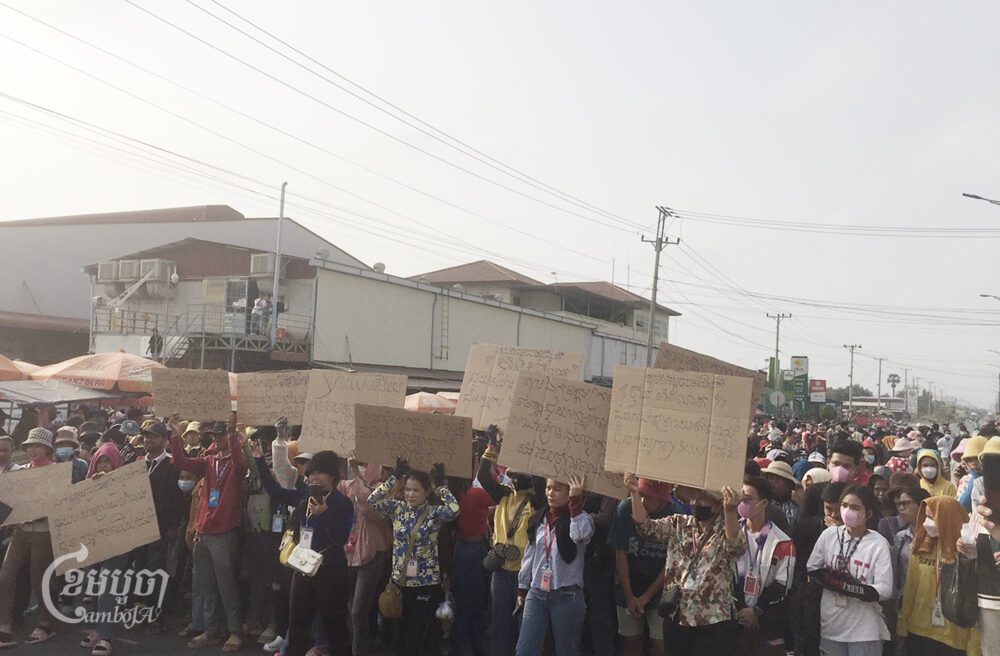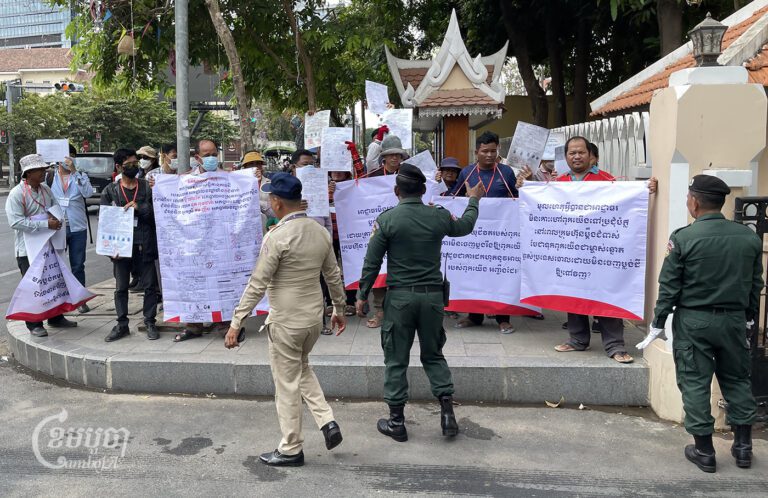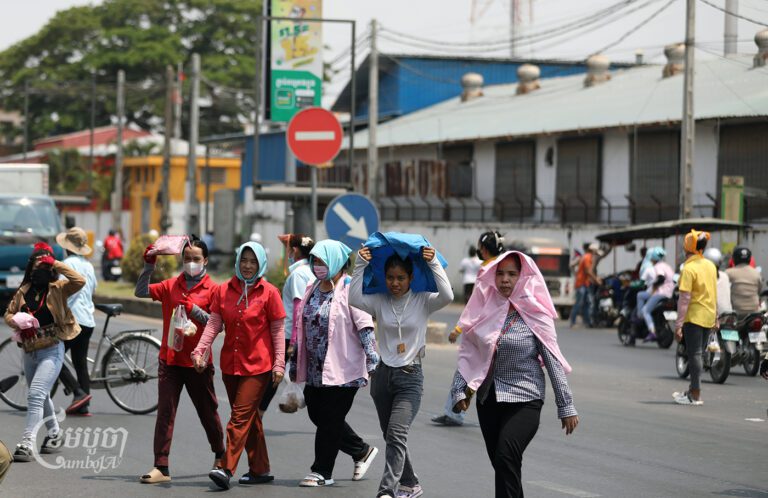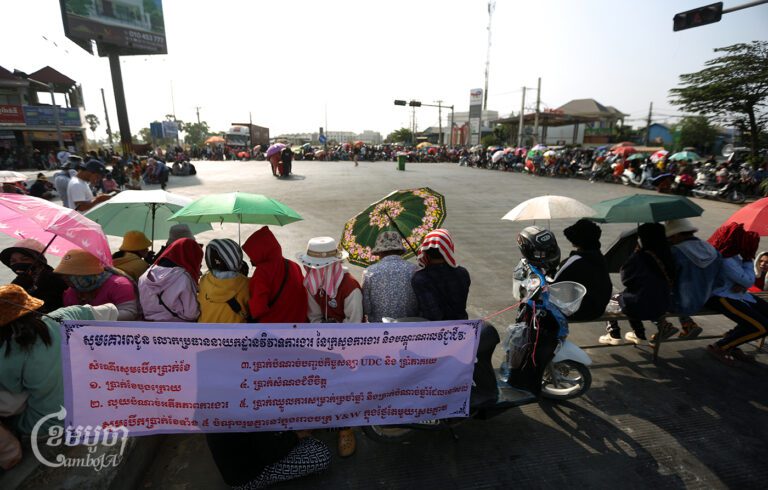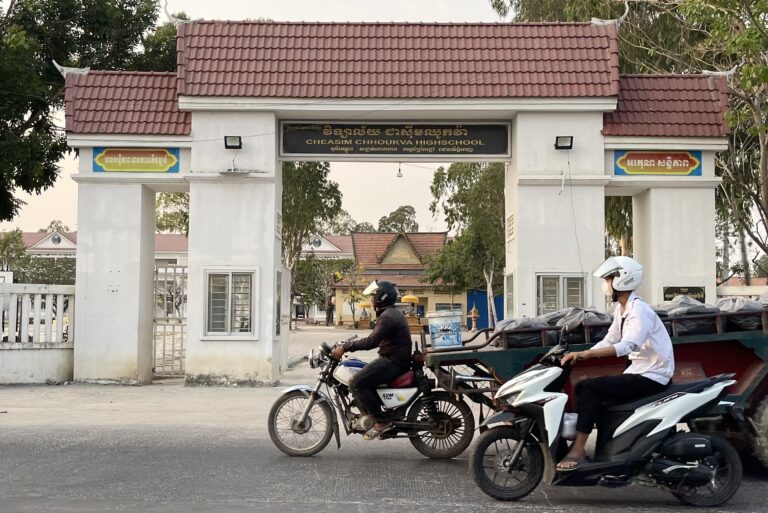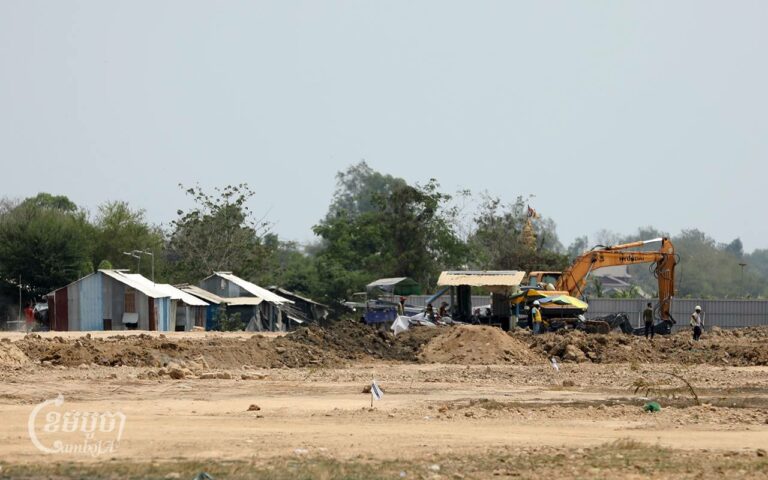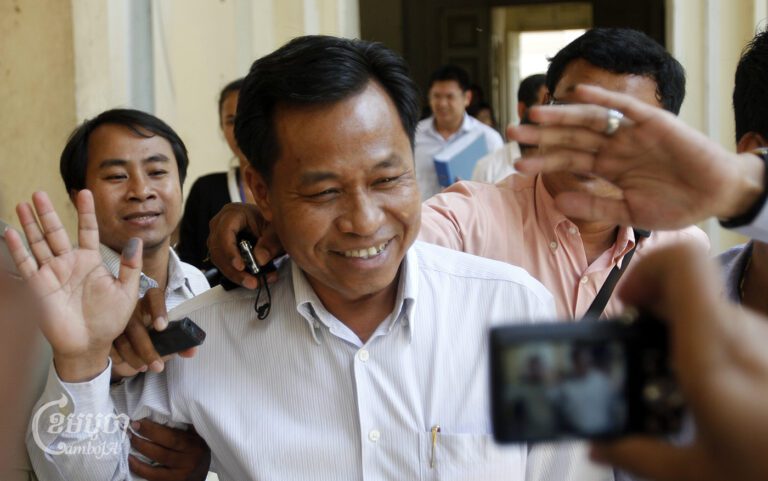Around 600 workers of Chinese-owned Y&W Garment Co Ltd marched to the Ministry of Labor and Vocational Training to submit a petition as part of their protest to demand for their wages and benefits from the owner who suddenly declared bankruptcy. Workers have not been paid their last month’s salary.
On March 9, 2024, the protesters gathered at 7am in front of the factory in Prek Chrey village, Spean Thmor commune, Dangkor district, Phnom Penh, before proceeding to walk to the ministry around 8.30am. After walking for two kilometers, they were met by ministry official Touch Sokmuth, head of Intervention and Strike, who received their petition.
He ensured that the “last salary of employees will not be lost”, and the five benefits will be received by the employees. However, despite the ministry’s promise of a resolution, they have little hope of that happening.
Union representative Phan Borey said the purpose of the protest was to seek an intervention from the ministry and “if no officer came to help them, they would march to the ministry to hand over the petition”.
They want the factory owner to pay the workers’ one month salary and other benefits before it shuts down.
“Our biggest aim is to prepare workers’ fingerprints to submit a petition to the ministry to take action against [the company] to legally settle the wages and benefits as well as other compensation according to the law.”
Borey said there was no production in the final month, and some machines were removed but the company did not ask workers to stop coming to work or have their work hours suspended. Just a week before the protest, workers were suddenly informed of the impending shutdown as a result of bankruptcy.
“We just found out on March 1 that the employer’s representative, as well as their child, sent a message that they could not afford to pay the workers on March 7, 2024. So, the workers will lose everything and what we see is that there is nothing to do. But, the important thing is that the company has not announced whether it would suspend or close anything, but they might do it quietly.”
According to Borey, there are around 3,000 workers working in the factory.
Another garment worker who joined the protest, Touch Theara, who is six months pregnant, said she had been working at the factory for more than a year and is worried about her future if the factory closes. “[There will be] no job and income as I get ready for childbirth. Even if I go to work in a new factory, they will not accept me.”
“I urge the relevant ministries to expedite the settlement of workers’ salaries and benefits.” The 31-year-old is worried about looking after her baby when she has no job to support her family. “I am about to give birth, but I do not have enough money. I need money to feed my family, but now I do not know what to do. It is going to be difficult for someone like me not to have a job,” said Theara.
Another worker, Vuth Srey, who joined the protest, said she had been working for the company for five years, producing children’s clothes and accessories.
Her family’s daily living depends on her garment salary but if the factory shuts down, her livelihood will be affected because she has no money to pay for the rent of their room and bank loans.
“Our household income depends entirely on my factory work. My becoming unemployed with the employer not paying our salary will impact my family’s income. We have expenses such as bank payments and room rent, which is going to be difficult [to settle].” She urged the new prime minister and relevant leaders to find a solution as soon as possible.
Following the receipt of the petition by the labor ministry officer, worker Suong Kul said he felt relief from the guarantee of a resolution but remained concerned about the amount of money needed to pay for his children’s education, food, bank loan and room rental. If the ministry delays solving their issue, workers will not be able to protest because they would have run out of money.
“I currently only have the media’s help to urge the ministry to help us solve the issue quickly so that I can have my salary and find a new job,” said Kul.
Based on past experiences, he only places “30 percent” hope on the ministry resolving their case. There are “always comforting words for a while”, he said, but as the resolution is delayed, the weaker their demonstration will become.
“I used to be part of many protests in factories, and in most of them, they [authority] would just come to comfort us for a while. If they want to solve it, it would be quick, but will delay it longer until we run out of money so that the demonstrations become weaker,” he said.
He called on the new prime minister to help solve their problem by speeding up the payment of their salaries and bonuses. “I only just ask for this.”
In the afternoon of March 9, the ministry released a statement urging workers, legal advisers, local unions and other stakeholders to call off their protest immediately, which was blocking the road and causing traffic congestion. Instead, they were told to seek a legal resolution to “maintain public order and in the interests of the general public”.
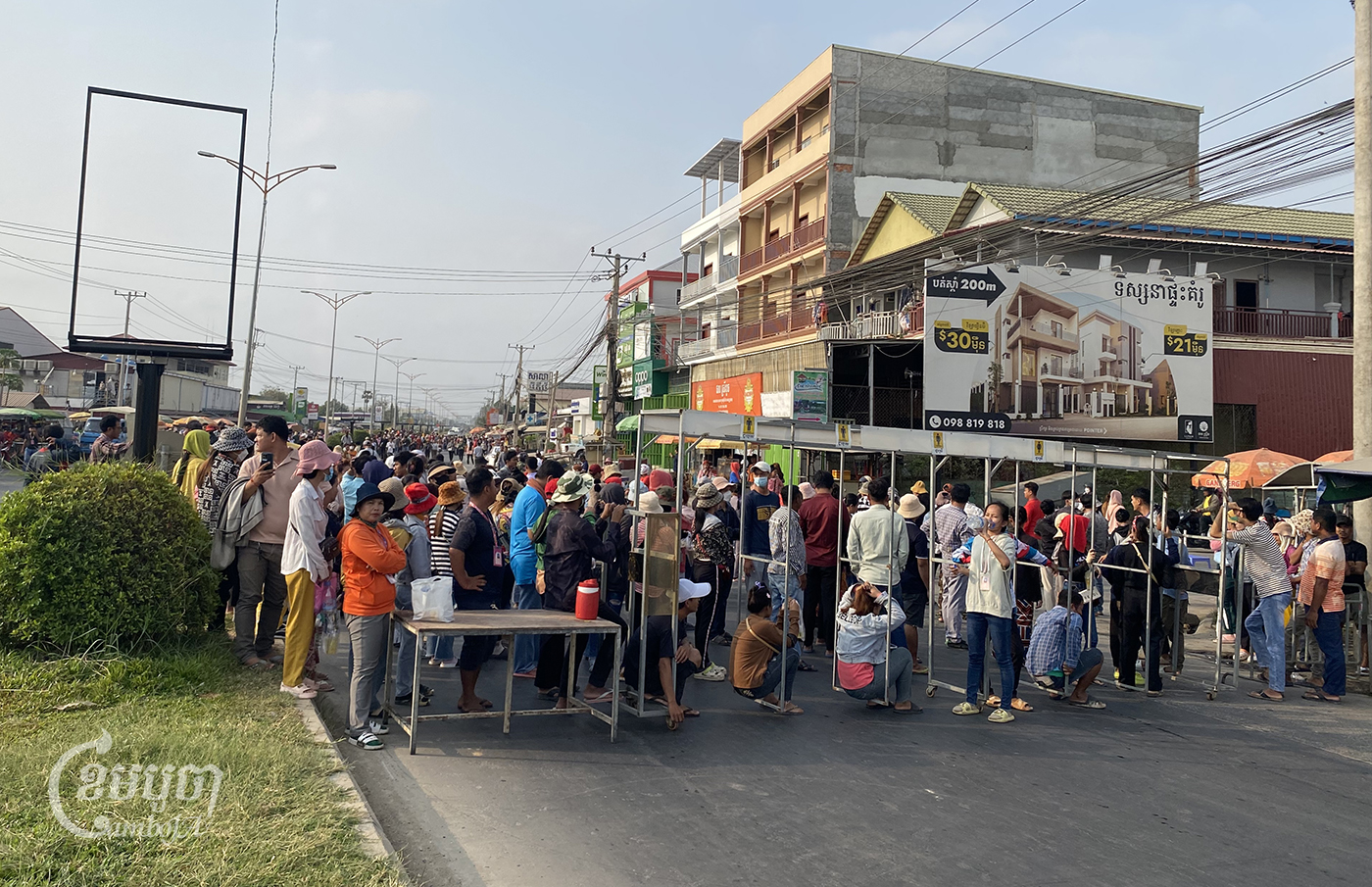
The ministry said the labor dispute at Y&W Garment was a case where the company is closing down because the employer ran away, thus it had to be settled in accordance with the labor law and bankruptcy law.
“According to the law, the ministry will sue the company to request an order to protect the property and resolve the grievance so that it can pay wages and other benefits to all workers,” it added.
The ministry asked legal advisers, local unions and other stakeholders to be aware of the law, be professional and conscientious, and not take advantage of any form of labor dispute. They were also warned against misinterpreting the law and acting contrary to the intent and principles of the law.
“Those who attempt to misinterpret the law with the intent of causing illegal protests shall be held accountable before the law,” the ministry added.
Khun Tharo, program manager for the Center for Alliance of Labor and Human Rights (CENTRAL), said in the past when there were similar cases, there was always the use of all kinds of strike and demonstration mechanisms on bankruptcy and court procedures to declare property assets to pay the workers. Generally, the payment does not follow the labor law, which means that workers lose a lot of benefits.
Moreover, he observed, settlement via this manner is a “routine practice”, with companies evading liability and using the excuse of factory closures to escape obligations. Therefore, he suggested that the ministry conduct a clear and accurate investigation.
“For this case, I think the labor ministry should investigate in a clear, transparent and credible manner. Is Y&W bankrupt, is there an economic crisis or a shortage of buyers?” Tharo said. “Because in the past, in cases of similar factory closures, employers often used the economic or financial crisis as an excuse to avoid legal obligations, especially salary payments when the factory closes.”
So far, more than 2,000 union representatives and workers have asked CENTRAL to intervene in their claims for compensation. In Y&W, the organization is investigating the procedure relating to the company’s factory closure announcement, whether it has debts, and the claim that there were no orders. The latter could be linked to low buyers.
For Y&W, protests are not new. Early 2021, some 6,000 workers held a protest, carrying placards and blocking a public road, in their effort to urge the owner to provide seniority payments and severance pay.
Prior to that in October 2014, 200 workers called on the government to compel Y&W to remove disciplinary wage docking for the time they went on strikes, reinstate two unionists, and 2,000 riel ($0.50) to their lunch money.


